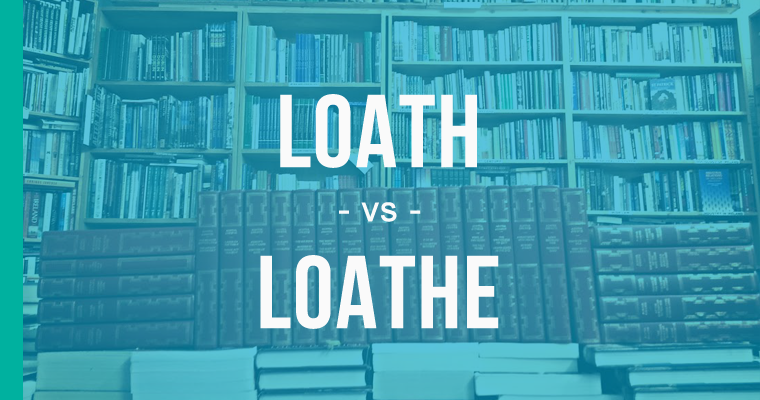Loath or Loathe – How to Use Each Correctly

What is the Difference Between Loath and Loathe?
Contents
Loath and loathe are two English words with very similar spellings and pronunciations, but because their definitions are not the same, the two words are not interchangeable.
Loath is an adjective that means reluctant or unwilling.
- I am loath to go to a party where I don’t know anyone.
Loathe is a verb that means hate or feel disgusted by.
- He loathes Christmas music. He avoids hearing it whenever he can.
Now, let’s go over the specific ways each of these words are used.
Using Loath in a Sentence
When to use loath: Loath acts as an adjective that describes not wanting to do something.
For example,
- The atheist was loath to go to church with his family.
- The sleepy child is loath to wake up for school.
There are a few common idioms and collocations that use loath:
- nothing loath: quite willing
- Upon rescue, the stranded and thirsty sailors, nothing loath, drank as much water as possible.
- loath to admit: unwilling to say one did something wrong
- The President was loath to admit his mistake.
- loath to give up: reluctant to lose an opportunity or thing
- She was loath to give up her chance to sing in the school musical.
Loath and loathe actually share a common root, which explains why both words have a negative meaning.
Using Loathe in a Sentence
When to use loathe: Loathe is a verb that means hate or despise.
For example:
- Cats and dogs often loathe one another.
- Introverted individuals usually loathe giving speeches.
There are a couple of expressions that use loathe:
- to love or loathe: to feel very positively or very negatively about someone or something
- Love him or loathe him, you’ll see him everywhere since he is the most famous actor in the world.
- to fear and loathe: to be scared of and to hate someone or something
- Although the nation’s news reports claim all the people love their leader, there are rumors that the citizens actually fear and loathe him.
Loathe is a stronger word than hate, so it is not as common.
Remembering Loath vs. Loathe
One way to remember the difference between these two words is to look at the spelling of loathe.
Loathe is a verb that ends in the letter e, just like the word hate. The fact that these two words are synonyms and end in the same letter can help you remember the relationship between them.
You could also remember that loath and bath both end in th, and that cats and many other animals are loath to take baths.
Outside Examples
- The Fed won’t raise its benchmark federal-funds rate on Wednesday, just six weeks after it raised it for the first time in nearly a decade. It’ll also be loath to abandon the guidance from its last policy statement that it “expects that economic conditions will evolve in a manner that will warrant only gradual increases in the federal funds rate” but that “the actual path of the federal-funds rate will depend on the economic outlook as informed by incoming data.” –Wall Street Journal
- It also means investing. Millennials seem loath to jump into the stock market, but doing so is the way to build real wealth. –USA Today
- Most starting pitchers loathe rain delays, concerned that the long break can cool them down to the point where their managers pull the plug on the outing altogether. –New York Daily News
- If you loathe gefilte fish, that staple of the Seder, it may just be that you’ve never had it homemade. –New York Times
Quiz: Loathe vs. Loath
Instructions: Fill in the blank with the correct word, either loathe or loath, in the correct form.
- The reclusive writer was _______________ to speak to journalists.
- The lazy child ________________ exercise.
- Because he was afraid of heights, he ______________ living on the mountaintop.
- The child loved most dairy products, such as milk, cheese, and butter. Therefore it was strange that she was ___________ to try yogurt.
- I can’t stand my coworker. She is loud, rude, and very annoying. In fact, I absolutely __________ her.
Article Summary
Should I use loath or loathe? These two words both relate to negative emotions, but they are different parts of speech. Therefore, they cannot be used in the same way.
- Loath is an adjective which means disinclined or averse.
- Loathe is a verb that means detest.
Using the information above can help to ensure that you don’t mix up these two similar but different words.
Quiz Answers
- loath
- loathes
- loathed
- loath
- loathe
